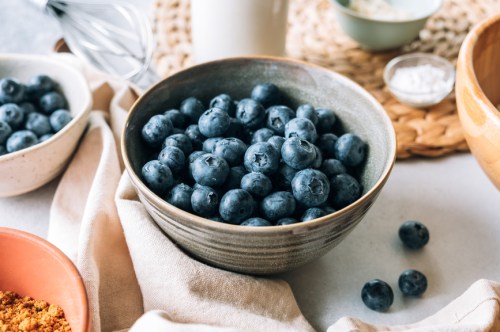‘I’ve Been a Longevity Nutritionist for 30 Years, and These Are the Top 4 Foods I Tell My Clients To Eat Every Day’
Discover a longevity nutritionist's top four foods for healthy aging that she recommends her clients eat daily.

It seems like every day, a new buzzy health-related trend pops up with claims of being the next big thing for boosting longevity. This inevitably makes cutting through the noise of “eat this, not that” on social media both frustrating and tricky. However, according to Kimberly Melton, RD, a longevity-focused registered dietitian with 30 years of experience in the field and the owner of NutritionPro Consulting, simplicity is best, especially when it comes to choosing foods that promote healthy aging.
Experts in This Article
registered dietitian and longevity nutritionist
We recently caught up with Melton, who revealed four simple, tried-and-true foods she often recommends her clients eat regularly. And get this: They’re nothing fancy… really. In fact, if this were a game of Family Feud, chances are they would be the top answers you’d guess. Yet, many of us might not be eating enough of ‘em. (But, hey, it’s never too late to start!) Ahead, we delve into the four top foods this longevity expert highly recommends that folks eat for overall well-being that have the biggest impact on long-term health and support a wide array of healthy biological systems as we age.
4 top foods a longevity nutritionist recommends folks eat regularly
1. Beans and Legumes
At the top of Melton’s list are beans and legumes for boosting longevity. “These tiny nutrition powerhouse foods are packed with plant-based protein, fiber, vitamins, and several minerals,” Melton says. Yet, this should come as little surprise, considering we hear beans brought up time and time again regarding the Blue Zones, where folks live well into their 100s (longevity researcher Dan Buettner goes as far as to say that eating about a cup of beans a day throws an extra four years of life expectancy your way on average).
Another perk of eating beans? They’re cheap and pair well with just about anything… even longevity-boosting protein brownies (!). “They are not only inexpensive but can be combined with other foods without overpowering flavors,” Melton says.
2. Nuts
As cliché as it may sound, we’re nuts about nuts. Melton agrees they’re an easy way to add a solid source of nutrition to any menu. “Nuts are a heart-healthy food because they contain considerable amounts of essential, plant-based fat like omega-3 fatty acids, which help with inflammation and may lower LDL cholesterol,” Melton says. (Pro tip: Don’t forget to store nuts in the fridge to help boost their longevity).
3. Berries
Although apples tend to steal the spotlight—you know, the whole apple a day keeps the doctor away thing—berries are just as beneficial. “Fruits such as blueberries, raspberries, and strawberries are an excellent choice. They have substantial amounts of phytochemicals, which include anthocyanins, that may help reduce the risk of cardiovascular disease, type 2 diabetes, Alzheimer’s, and dementia,” Melton says. And we sure love anti-inflammatory anthocyanins around here. But if berries aren’t your jam (pun intended), there are plenty of other foods rich in polyphenols (anthocyanins are a type of polyphenol) that help boost longevity. Think herbs and spices (like turmeric, ginger, and peppermint), dark chocolate, coffee, and teas.
4. Olive Oil
Last but certainly not least, we’ve got olive oil. “Olive oil has an abundance of heart-healthy monounsaturated fatty acids. It’s also high in polyphenols, a compound found in plant foods that acts as an antioxidant and helps ward off cell damage and inflammation in the body,” Melton says. Taking it back to the Blue Zones for a minute, it’s one of the two types of cooking oils that most of them use for cooking (avocado oil being the other).
Not to mention, olive oil is also a potent antioxidant thanks to its polyphenol properties (similar to berries). While the American Heart Association (AHA) considers olive oil the best cooking oil for cardiovascular health. Studies show that those who consume half a tablespoon of olive oil per day experience a 15 percent lower risk of having cardiovascular disease.
A registered dietitian explains the benefits of consuming olive oil and why it’s basically liquid gold:
Sign Up for Our Daily Newsletter
Get all the latest in wellness, trends, food, fitness, beauty, and more delivered right to your inbox.
Got it, you've been added to our email list.










